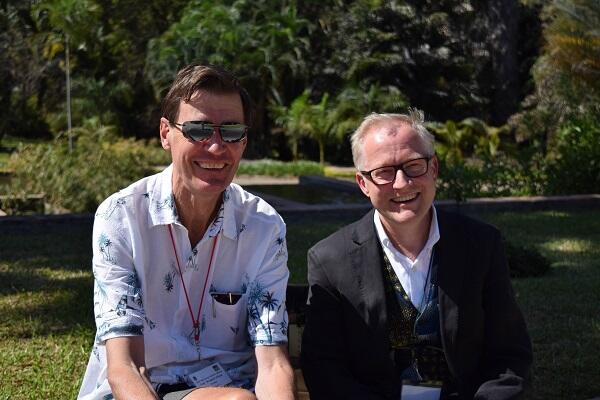
“Measurement and Analytical Challenges in Applied Health Research” Applied Health Research & CAHRD Plenary at the Annual Scientific Meeting of the Wellcome Trust Liverpool Glasgow Centre for Global Health Research
Following a brief introduction from Prof Squire, CAHRD Director, Prof Richard Lilford, from Warwick Medical School presented the main plenary talk on “Synthesising different domains of evidence to change policy and practice”. The talk considered the possibility of populating a causal pathway integrating qualitative and quantitative information and data from the literature while taking into account potential biases in the data. Prof Lilford described the Bayesian approach to integration of all of these types of information to estimate the effectiveness of complex interventions where the kind of precise and valid measurement of a single parameter of interest is not possible.
This was followed by a presentation from Dr Jahangir Khan, Senior Lecturer, LSTM who talked about the Socio-economic impact of major disease on household wealth, the conclusion of which showed huge socio-economic inequalities between poor or less-poor for a specific range of diseases including Lymphatic Filiariasis, Onchocerciasis, schistosomiasis, Soil-transmitted helminths and Trachoma. The findings contribute to assessing health-equity impact of disease control.
Sam Watson from Warwick Medical School then spoke about Bayesian analysis and how it will be applied in the TB-RROC Trial. The use of informative priors in the Bayesian approach provides greater statistical power and enables establishment of the probability of non-inferiority given current knowledge.
Blessings Chisunkha from REACH Trust presented the use of Google Earth Pro and mobile technology in preparation for a cluster-randomised trial evaluating the Practical Approach to Lung health in rural Malawi. The technology reduced duration and costs of manual field-based surveillance projects since electronic mapping eliminates travel and paper-questionnaire costs costs.
Jason Madan, Assistant Professor in Health Economics at Warwick Medical School presented dissaving as a proxy for catastrophic costs in care seeking for TB, the objective being to determine whether the sale of assets or uptake of loans (dissaving) is a potential pragmatic proxy indicator of catastrophic costs for monitoring and evaluating progress towards the End TB Strategy Target. He concluded that dissaving is an informative indicator of financial hardship and a convenient potential proxy for catastrophic costs. As it doesn’t require complex patient questionnaires it is a suitable indicator for routine monitoring and evaluation.
The session ended with a presentation from Ivor Langley, LSTM on combined health system and transmission modelling for TB diagnostic algorithms. Several new diagnostic tools for TB have been endorsed by WHO and national programmes for TB face the decision on which tools to implement. In the example here an integrated modelling approach was proposed that links operational and transmission components, in Tanzania this approach has been used to assist in the development of a strategy for TB diagnostics uptake and roll-out by the national TB programme.